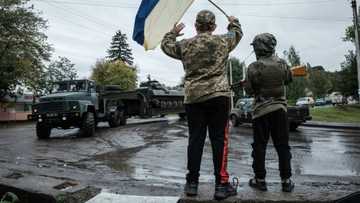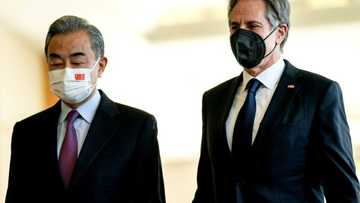North Korea fires ballistic missile, Seoul says

Source: AFP
PAY ATTENTION: Сheck out news that is picked exactly for YOU ➡️ find the “Recommended for you” block on the home page and enjoy!
North Korea fired a ballistic missile Sunday, Seoul's military said, just days after a US aircraft carrier arrived for joint drills with the South in a show of force against Pyongyang.
With talks long stalled, nuclear-armed North Korea has doubled down on its banned weapons programmes, even revamping its laws earlier this month to declare itself an "irreversible" nuclear power.
The Sunday launch is the latest in a record-breaking blitz of weapons tests by Pyongyang so far this year, including firing an Intercontinental Ballistic Missile at full range for the first time since 2017.
South of the border, hawkish new President Yoon Suk-yeol, who vowed on the campaign trail to get tough with Kim Jong Un, has ramped up South Korea's joint drills with key security ally the US.
Seoul's military "detected one short range missile fired by North Korea at 6:53 today around Taechon in North Pyongan province towards the East Sea," the Joint Chiefs of Staff said.
"Our military maintains a full readiness posture and is closely cooperating with the US while strengthening surveillance and vigilance," the statement added.
PAY ATTENTION: Follow Briefly News on Twitter and never miss the hottest topics! Find us at @brieflyza!
Japan's coast guard issued a warning for ships after the launch, and Tokyo's defence minister Yasukazu Hamada said the missile had reached a maximum altitude of around 50 kilometres (30 miles).
If the missile had a regular trajectory, it likely "flew around 400 kilometres and fell in waters off North Korea's eastern coast," he said, adding it landed outside of Japan's Exclusive Economic Zone.
"The repeated ballistic missile launches by North Korea are absolutely unforgivable and the remarkable improvement in its missile technology is something we cannot overlook," Hamada said.
Kamala Harris visit
South Korea's President Yoon, who took office in May, has vowed to beef up joint military exercises with the United States after years of failed diplomacy with North Korea under his predecessor.
On Friday, the nuclear-powered USS Ronald Reagan and vessels from its strike group docked in the southern port city of Busan, part of a push by Seoul and Washington to have more US strategic assets operating in the region.
Yoon is also due to meet US Vice President Kamala Harris Thursday when she visits Seoul this week, following a visit by President Joe Biden in May, and US House Speaker Nancy Pelosi last month.
"The timing of this latest test is sandwiched between the arrival of USS Ronald Reagan this week and VP Harris' visit to Seoul next week," Soo Kim, an analyst at the RAND Corporation, told AFP.
"It's North Korea's way of showing defiance of the alliance and injecting itself at an opportune time."
The USS Reagan will take part in joint drills off South Korea's east coast this month.
Washington is Seoul's key security ally and stations about 28,500 troops in South Korea to protect it from the North.
The two countries have long carried out joint exercises, which they insist are purely defensive but North Korea sees them as rehearsals for an invasion.
"Pyongyang could be making a show of strength while a US aircraft carrier is visiting South Korea for defense exercises," said Leif-Eric Easley, a professor at Ewha University in Seoul.
"But North Korea's major tests are, most of all, part of a long-term campaign for advancing offensive military capabilities."
Nuclear test next?
South Korean and US officials have been warning for months that North Korean leader Kim Jong Un is preparing to conduct another nuclear test.
South Korea had also detected signs the North was preparing to fire a Submarine Launched Ballistic Missile (SLBM), the president's office said Saturday, a weapon Pyongyang last tested in May.
The isolated regime has tested nuclear weapons six times since 2006. Its last and most powerful one in 2017 -- which Pyongyang claimed was a hydrogen bomb -- had an estimated yield of 250 kilotons.
"North Korea might be delaying its seventh nuclear test out of respect for China’s upcoming political conference that Xi Jinping is tightly scripting to extend his leadership," Easley said.
"But there are limits to Pyongyang's self-restraint."
PAY ATTENTION: Сheck out news that is picked exactly for YOU ➡️ find the “Recommended for you” block on the home page and enjoy!
Source: AFP




